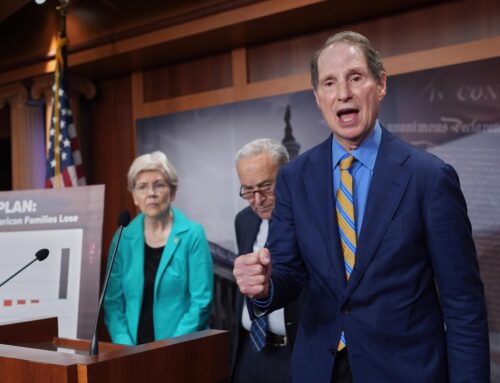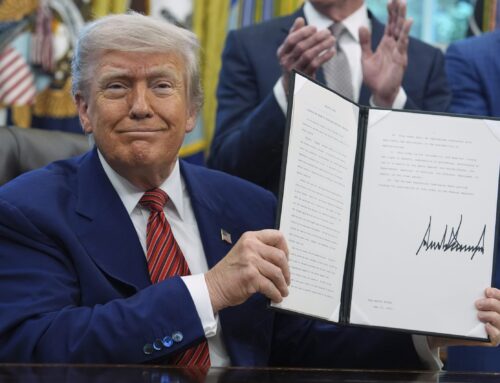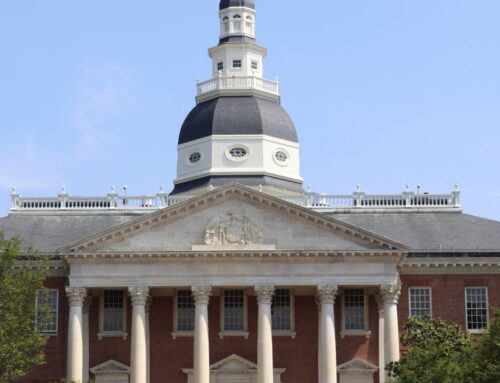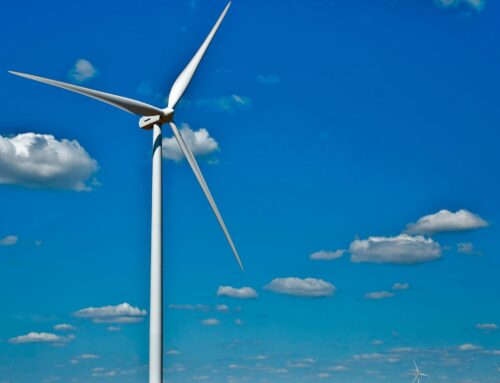These maps show where Trump’s ‘big beautiful’ bill will cancel clean energy
June 30, 2025
Analysis of the “One Big Beautiful Bill” Act (OBBBA) nearing final votes in Congress shows that the legislation based on President Donald Trump‘s agenda threatens 4,500 clean energy projects, putting hundreds of thousands of jobs at risk and likely adding billions of dollars to annual energy costs for Americans within five years.
“It’s terrible,” Robbie Orvis, senior director of modeling and analysis at the clean energy think tank Energy Innovation, told Newsweek. “It’s potentially hundreds of billions in investment that will be vaporized and the long-term ramifications for U.S. manufacturing are potentially very negative.”
Energy Innovation used its peer-reviewed energy policy simulator to model the effects of the termination of clean energy tax credits and other elements of the legislation that emerged from the House.
The final form of the bill is yet to be determined, and many clean energy industry leaders had hoped the bill might be improved in their favor in the Senate. But clean tech trade groups have been critical of Senate action so far, with the Solar Energy Industries Association calling the Senate version “a direct attack on American energy.”
Analysis by Energy Innovation produced this map showing the states that stand to lose the most jobs due to the bill’s cuts to clean energy tax credits.
Courtesy of Energy Innovation
The OBBBA’s blow to clean energy comes on top of a slowdown in clean tech investment in the first months of the Trump presidency, with more than two dozen major projects canceled or cut back. Maps shown here produced by Energy Innovation and researchers at the Wellesley College Environmental Studies Department show how canceled projects, lost jobs and higher prices could affect each state.
The Energy Innovation analysis showed that by 2030, the bill could result in the loss of 840,000 jobs associated with renewable energy deployment and the manufacturing of clean technology, batteries, EVs and the services and supply chains that support that work.
Incentives in the Inflation Reduction Act (IRA) of 2022 have stimulated at least $321 billion in new private energy and manufacturing investments, analysts said. Solar, wind and batteries, especially, have seen phenomenal growth in the U.S., accounting for more than 90 percent of the new generating capacity to the nation’s electric grid last year, according to the Energy Information Administration.
Renewable energy and battery storage have become the cheapest and fastest way to add power to the grid as electric companies scramble to meet surging demand. By adding costs to those energy sources, the OBBBA will drive up electricity prices, Orvis said.
Analysis by Energy Innovation shows how much energy costs are likely to increase due to effects of the OBBBA. By raising costs of renewable energy and batteries, the analysts found, the legislation will increase the use of more costly fossil fuels.
Courtesy of Energy Innovation
“The energy bill impacts are quite large,” he said, so much so that he and his colleagues ran multiple cross-checks to make sure the numbers were right. The Trump administration wants to boost the use of fossil fuels to generate electricity.
Rising demand for natural gas will drive up its price, the analysis found, pushing power bills higher. Not only do electricity bills shoot up in the analysis, but the bill’s removal of incentives for EVs will add to long-term transportation fuel costs, Orvis said.
The energy bill increases vary around the country but hit especially hard in some states like South Carolina, where the analysis showed annual energy bills growing by $770 million across the state.
The Trump administration’s work to dismantle federal climate policy and clean energy support has already had a dramatic impact on the lean tech sector, according to research by Wellesley College Professor of Environmental Studies Jay Turner.
“It’s a dark cloud of uncertainty which has led to the highest level of cancellations, delays and rollbacks that we’ve seen since 2010, which is how far back our tracking goes,” Turner told Newsweek. “We’ve seen levels of cancellations and slowdowns that are more than five times greater than what we’ve seen in any other time period.”
Turner and his students maintain a comprehensive map of clean tech investments and developments in the U.S. called “The Big Green Machine.” Since Trump took office, however, the green map has shown a lot of red, the color indicating cancellations, delays and postponements of announced projects.
Wellesley College researchers have documented 29 clean energy projects that have been canceled, postponed or cut back since President Donald Trump took office, putting more than 21,000 potential jobs at risk.
Courtesy of Wellesley College Environmental Studies Dept.
Since Inauguration Day on January 20, 29 clean energy projects have been canceled, paused or scaled back, affecting $21.6 billion in private investment and putting 21,287 potential new jobs at risk. Four of those project delays came since the OBBBA passed the House on May 20.
Turner said the “battery belt” states of the Southeast and Midwest that had seen growth in battery manufacturing have taken the biggest hits so far.
“These are investments that were meant to give the U.S. a foothold in one of the fastest growing industries in the world,” Turner said. “And that’s the sector where we’ve seen the most slowdown in the last six months.”
Turner had identified four major battery projects that have been put on hold in the last five months in Georgia, Kentucky and South Carolina—all states that Trump won in the 2024 election.
One of the ironies of the highly partisan tilt to recent federal energy politics is that Republican lawmakers are poised to end policy that has primarily benefitted their states and districts. Although the IRA was championed by a Democratic president and passed without a single Republican vote in Congress, most of the clean energy investments the law triggered have landed in red states, Turner’s work showed.
Turner spoke with Newsweek while he was on a multi-state research road trip to visit recent clean energy development sites and to hear from industry leaders.
“People are saying, ‘I don’t know what’s going to happen,’ there’s so much uncertainty about what happens next,” Turner said. “It’s just a very difficult environment to be making long-term decisions about major manufacturing investments and all of this at the same time that many other parts of the world are investing deeply in these advanced technologies.”
The Energy Innovation analysis showed that, on a per capita basis, many of those battery belt states will suffer some of the biggest losses under the OBBBA as well, as higher costs for EV and grid storage battery makers will make it harder for them to compete with other countries.
“You can see there’s a big drop-off and the battery belt states are the ones that receive the brunt of that,” Orvis said. He said the upshot will be a reduced ability to bring clean tech manufacturing to the U.S., giving battery and EV makers elsewhere a big advantage.
A recent report from the International Energy Agency found that the bulk of global energy investments now go to clean energy and electrification rather than into new fossil fuel development, with more than $2 trillion flowing into clean tech and power grids. Orvis said he feared that the U.S. policy turn away from clean energy would cede that global market to others.
“China is sitting there, I’m sure, just watching this with delight,” Orvis said. “It’s handing it to them on a silver platter.”
Search
RECENT PRESS RELEASES
Related Post







